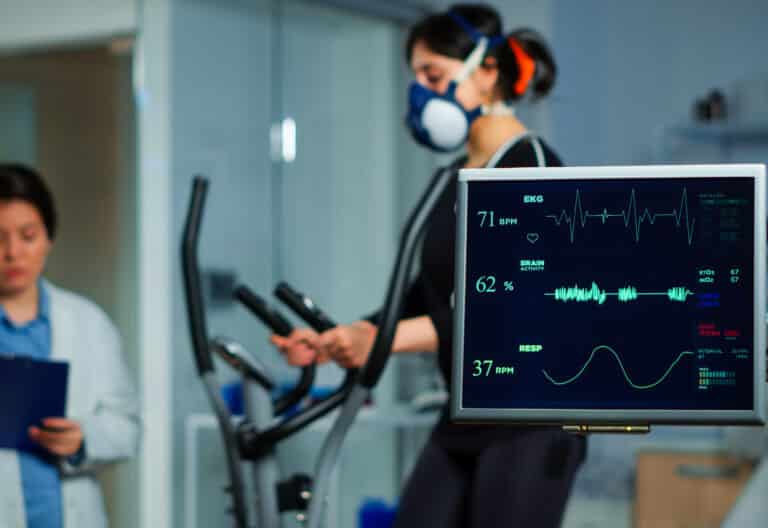Have you ever considered a career as an EKG technician? It’s an exciting field in the healthcare industry that involves conducting and analyzing electrocardiogram tests.
Guess what? You neither need a fancy degree or years of schooling nor have to empty your pockets. All that requires to become an EKG technician is a combination of education, skills, and training.
In this article, we will help you understand the education and skills requirements to become an EKG technician.
Also see: What is an EKG Technician

Let’s break down the Basic Requirements first –
Basic Requirements:
There are some basic minimum requirements to enroll in an EKG Technician program.
Obtaining your High School Diploma or GED
To pursue a career as an EKG Tech, you’ll need to ensure you have completed your high school diploma or GED.
Are you 18? Age Requirement
Most EKG Tech programs have a minimum age requirement of at least 18 years old to enroll. However, this may vary depending on the program and institution.
English Proficiency
Since EKG Tech programs involve studying medical terminology and communicating with patients and healthcare professionals, a basic command of the English language is necessary.
You might be asked to demonstrate your English proficiency through language assessment.
Basic Computer Skills
Technology is crucial in healthcare settings, and having basic computer skills is essential for EKG Techs. It’s helpful if you know using computers and navigating software programs.
Some programs may have additional prerequisites, such as having science or math as subjects, while others may require a criminal background check or immunization records.
Additional Prerequisites
Some programs may have additional prerequisites, such as having science or math as subjects, while others may require a criminal background check or immunization records.
Therefore, it’s advisable to check the admission criteria of the program you’re interested in; to ensure you meet all the minimum requirements for enrollment.
Education Requirements:
To start your career as an EKG tech, you need to meet certain education requirements. Here’s everything about that:
Getting An Associate Degree
You can become an EKG Technician by attaining an Associate Degree from any accredited University. They offer a Two-year program with $30,000 as tuition cost.
Yes, they are super expensive and might require r a student loan. Don’t worry! We have other options for you. Just stay tuned.
Getting A Diploma/Certification Program
Another way of becoming an EKG Technician is by opting for a diploma/certification program from a technical school or community college.
These programs take 1-year to complete and can cost between $5,000 to $15,000.
Plus, this is a full-time program. It means – scheduled classes and expenses for accommodation or travel.
Online Training Programs

We recommend online training programs. Why?
- Enrolling in the program with less than $5,000
- Learn at your own pace, from your comfort zone
- Finish your training conveniently in less than 4 months
- The best part, there is no burden of student debt
Read: How Long Is EKG Technician Training?
Hands-On Experience
After completing your EKG Technician program, the next step is to gain valuable hands-on experience through an internship or externship. The employers highly value practical experience in addition to classroom education.
Many EKG technician programs incorporate an externship phase where you work in a healthcare setting under the guidance of experienced professionals.
Note: To become certified as an EKG tech, you must complete a minimum of 10 electrocardiograms (ECGs). Post-completion, you meet the certification criteria and have acquired valuable clinical experience.
Certification: Become a Certified EKG Technician
Once you have completed your education and clinical training as an EKG technician, consider pursuing certification. Although certification is not always mandatory, it can significantly improve your job prospects and showcase your expertise in the field.
Organizations such as the National Healthcareer Association (NHA) and the American Society of Phlebotomy Technicians (ASPT) offer certification exams specifically designed for EKG technicians.
To be eligible for these exams, you must provide proof of completing an accredited EKG technician program or demonstrate a certain level of work experience in the field.
When you clear the exams, you are a Certified EKG Technician.
Read more: EKG Technician Jobs
Soft Skills Requirements
As an EKG technician, you need to have some soft skills; to help the patients and conduct your tasks smoothly.
Physical Stamina
Physical stamina is often overlooked but remains the crucial aspect of an EKG Technician.
On some days, you need to stand for the whole day. While at others, you need to move from one chamber to another, as you’ll need to frequently update the doctors and nurses about patients’ health and submit reports.
Additionally, performing numerous EKG tests throughout the day can be tiring. So, it’s important to be physically fit to fulfill your responsibilities effectively and consistently.
Having the necessary stamina ensures that you can carry out your duties with energy and efficiency, supporting the well-being of the patients you serve.
Communication Skills

Effective communication skills are crucial, especially when interacting with patients. You’ll need to explain procedures, address any concerns or questions, and ultimately help put patients at ease.
You’ll also need to communicate effectively with doctors and other healthcare professionals, ensuring accurate reporting of your findings.
Compassion and caring nature are also essential qualities for EKG technicians, as healthcare facilities can be overwhelming for patients.
Professionalism
Maintaining a high level of professionalism is key to building trust with patients. You can create a positive impression by displaying dependability, competence, and a serious approach to your work.
Some patients might experience high levels of stress, and your professionalism can greatly contribute to their comfort and confidence. Patients feel at ease when they perceive you as a professional, which will have a significant impact on their overall experience.
Also, you have to live in the moment. You must have a deep sense of instant problem-tracking and troubleshooting while remaining calm.
Patience
Having an abundance of patience is a crucial trait for an EKG technician. You should understand that some patients may feel anxious or nervous during tests. It is essential to create a calm and comfortable environment for them.
Demonstrating patience and understanding helps relieve their concerns and ensures a smoother and more pleasant experience for everyone involved.
Teamwork
EKG technicians actively engage, in close collaboration with doctors, nurses, and other healthcare professionals, fostering a seamless flow of information.
By working together harmoniously, they strive to deliver optimal care to patients. The ability to communicate effectively and share insights makes EKG technicians indispensable team players in healthcare settings.
Know more about the top 10 Skills and Duties of an EKG Technician.
Technical Skills Requirement

As an EKG technician, several skills and qualities are crucial for success in the field.
Here are some of the Technical skills requirements that you need to grasp during the process of becoming an EKG Tech:
Attention to Detail and Sincerity
Being sincere and detail-oriented is essential in performing EKG tests. You must accurately place electrodes on the patient’s body and ensure the EKG recording is clear and free from artifacts or interference.
Paying close attention to patient information and following procedures precisely is vital for accurate results.
Patient Care
EKG technicians often work directly with patients, so having good interpersonal and communication skills is important.
You should be able to make patients feel comfortable, explain the procedure to them, and address any concerns they may have.
Additionally, being empathetic and respectful towards patients is crucial in providing high-quality care.
Medical Terminology
A good grasp of medical terminology is crucial for effectively communicating with healthcare professionals and documenting patient information. You should be familiar with terms related to the cardiovascular system and EKG procedures.
Knowledge of EKG Equipment
You should have a solid understanding of how to operate EKG machines and other equipment used in electrocardiography.
It includes knowing how to attach electrodes to patients, adjust settings, and troubleshoot any technical issues that may arise.
Electrocardiogram Interpretation
You need to be able to read and interpret electrocardiograms accurately. It involves understanding – the different waveforms, segments, and intervals on an EKG strip. As well as recognizing any abnormalities or irregularities that may indicate a heart condition.
Tech-Friendly
Along with operating EKG machines, you may also need to use other electronic health records (EHR) systems or software for documentation and data entry.
Familiarity with computers and basic technological skills is beneficial for managing patient information and producing accurate reports.

Time Management
EKG technicians often work in fast-paced healthcare environments where efficiency is the key. Therefore, managing time effectively, prioritizing tasks, and working within deadlines, is essential. This skill ensures that the EKG tests are conducted on time, and patient schedules are maintained.
Professionalism and Ethics
Upholding professional conduct and maintaining patient confidentiality are critical aspects of any healthcare profession.
EKG technicians should adhere to ethical guidelines, respect patient privacy, and maintain the confidentiality of medical records.
You should work hard on acquiring and refining these technical skills. Once you perfect these skills, you are well-equipped to excel as an EKG technician and contribute; to the accurate diagnosis and treatment of cardiovascular conditions.
So, what skills do you already have or don’t? Take note and embark on the journey to become an EKG Technician. Thank us later.
Related Resources:
- Pros and Cons of Being an EKG Technician
- EKG Technician Certification
- Certified EKG Technician Salary
- EKG Technician Training





